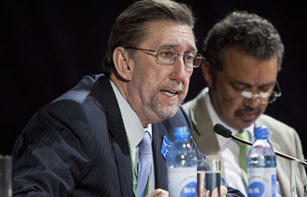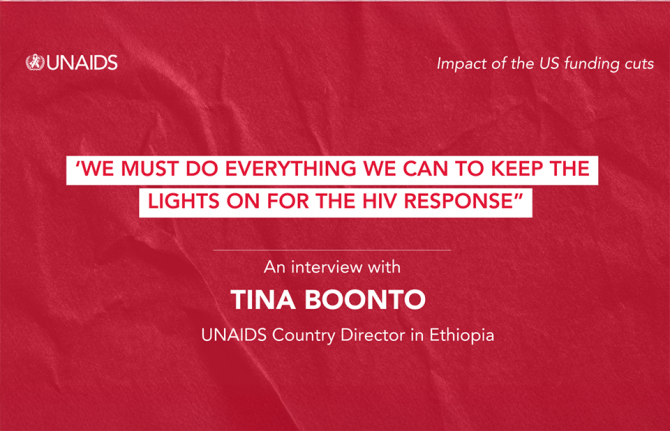
Feature Story
Strengthening health systems: delivering on the broader health and development agenda
07 December 2011
07 December 2011 07 December 2011
UNAIDS Deputy Director, Programme Dr Paul De Lay and Ethiopian Minister of Health, H.E. Tedros Adhanom Ghebreyesus.
Credit: UNAIDS/J. Ose
“Health and Social Affairs: Making Health Systems Work to Effective HIV Response,” was the title of a ministerial panel held on the third day of the International Conference on AIDS and STIs in Africa (ICASA). The panel highlighted how the AIDS response has had additional benefits for the broader health and development agenda.
UNAIDS Deputy Director, Programme Dr Paul De Lay participated in the panel together with the Ethiopian Minister of Health, H.E. Tedros Adhanom Ghebreyesus, Director of the CDC Center for Global Health, Dr Kevin De Cock and the Executive Director of SAfAIDS Lois Chingandu.
Responding to the critics who say that the AIDS response has created vertical programmes at the expense of the broader health system, Dr De Cock asserted that, “there is evidence that the scale up of AIDS services has had a positive impact on health systems strengthening in the [African] continent.”
For example, the push for HIV treatment has focused attention to the lack of human resources, poor infrastructure, insufficient supplies and other related issues.
“It is time to take stock of the many vertical health initiatives that have produced measurable results but also created parallel structures, high net transaction costs, and fragmentation,” said Dr De Lay. “We strongly advocate for integrated approaches that maximize efficiencies and achieve positive health beyond HIV, in the broader health system,” he added.
It is up to us to work hard in our own capacity to reach the three zeros. The dependence syndrome can be broken down and communities should have the capacity to respond for themselves
Auxiria Mwanza from Zambia Red Ribbon Award winner 2010
The Ethiopian Minster of Health H.E. Ghebreyesus in his address stressed the importance of integration of services within health systems. “Strong health systems mean better results for HIV but also better results in other health related issues such as maternal health or immunization programmes.
For health systems to deliver results, Dr De Lay added, there is a need to address the legal, policy and regulatory environment as well as the social and cultural context which may act as barriers for people to access services.
Social change in the AIDS response has often been driven by civil society, and many lessons can be learned from this experience. There is still a need to put in place critical enablers for health systems, such strong advocacy to meet funding commitments, respect for human rights, and political commitment.
“Effective systems depend on effective governments and are based on the respect for human rights,” said civil society representative Ms Chingandu. “Health systems cannot be effective without a robust and accountable civil society,” she added.
Since the dawn of the AIDS epidemic, activist have not only generated investments in AIDS but have instilled more vigorous sense of accountability and urgency among in global and national leaders in delivering on the commitment of health for all.
The panel concluded that the AIDS response has had a far-reaching and unquestionable impact on health care globally: building infrastructure and systems, improving the quality of services, reaching socially marginalized and vulnerable groups, and engaging consumers.



